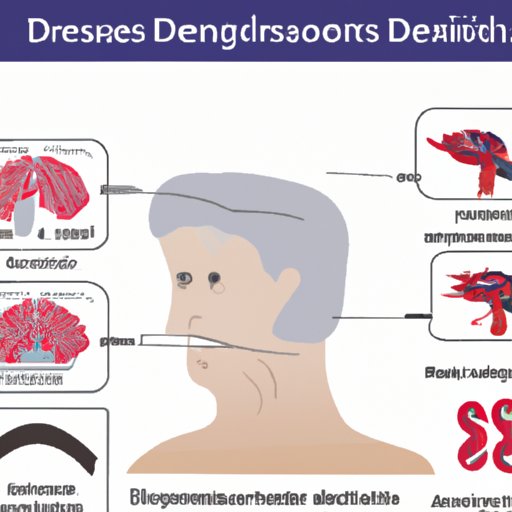
Introduction
Neurodegenerative diseases are a group of disorders characterized by the progressive loss of neuronal cells in the central nervous system. These diseases can occur at any age and are typically chronic, debilitating, and ultimately fatal. The purpose of this article is to inform readers on the causes, symptoms, types, diagnosis, treatment, and management of neurodegenerative diseases, as well as the ongoing research efforts and impact it has on individuals, families, and society.
Explaining Neurodegenerative Diseases
The causes of neurodegenerative diseases are not fully understood, but it is believed to be caused by a combination of genetic, environmental, and lifestyle factors. As neuronal cells degenerate and die, individuals may experience symptoms such as cognitive decline, memory loss, movement disorders, and psychiatric symptoms. Neurodegenerative diseases can affect cognitive abilities by disrupting the normal functioning of the brain and impairing memory, learning, and decision-making processes.
Types of Neurodegenerative Diseases
There are various types of neurodegenerative diseases, each with their unique symptoms and progression. Alzheimer’s disease is the most common type of neurodegenerative disease, characterized by memory loss, confusion, and difficulty communicating. Parkinson’s disease affects movement and coordination, with symptoms such as tremors, stiffness, and trouble walking. Huntington’s disease is a rare genetic disorder that causes involuntary movements, personality changes, and cognitive decline. Amyotrophic Lateral Sclerosis (ALS) affects the motor neurons in the brain and spinal cord, leading to muscle weakness, difficulty speaking, and breathing problems. Frontotemporal dementia affects the frontal and temporal lobes of the brain, leading to changes in behavior, language, and personality.
Diagnosis, Treatment, and Management of Neurodegenerative Diseases
Diagnosing neurodegenerative diseases can be challenging, and it typically requires a comprehensive evaluation of an individual’s medical history, physical examination, and neurological testing. There is no cure for neurodegenerative diseases, and treatment options are primarily focused on managing symptoms and improving quality of life. Treatment options may include medication, therapy, and speech and occupational therapy, among others.
Preventing Neurodegenerative Diseases
Although there is no known way to prevent neurodegenerative diseases, research suggests that adopting healthy lifestyle habits may help reduce the risk of developing them. Such habits include engaging in regular exercise, eating a healthy diet rich in fruits and vegetables, maintaining a healthy weight, and engaging in mentally stimulating activities like brain games and Sudoku puzzles.
Genetics and Neurodegenerative Diseases
Genetic factors play a significant role in the development of neurodegenerative diseases. For example, individuals with a family history of Alzheimer’s, Parkinson’s, or Huntington’s disease may be at an increased risk of developing these diseases. However, genetic testing and counseling may help individuals understand their risk and make informed decisions about their health.
Current Research on Neurodegenerative Diseases
There is ongoing research into finding effective treatments for neurodegenerative diseases. This research is focused on understanding the underlying mechanisms of these diseases, developing new therapies, and discovering biomarkers that can help with early diagnosis and tracking of disease progression.
Impact of Neurodegenerative Disease
Neurodegenerative diseases have a significant impact on patients, their families, and caregivers. Patients may experience emotional and psychological distress, and this can be particularly challenging for family members and caregivers who often have to provide constant care and support. The cost of care for patients with neurodegenerative diseases can also be high, both in economic terms and the toll it takes on caregivers, who may have to leave their jobs to take care of their loved ones.
Conclusion
Neurodegenerative diseases are chronic and debilitating disorders that affect millions of individuals worldwide. Despite ongoing research efforts, there is currently no cure for these diseases. However, there are various treatments and management strategies available that can help improve the quality of life of patients. It is crucial to raise awareness about neurodegenerative diseases and support ongoing efforts to find new therapies and ways to prevent these diseases from developing in the first place.





